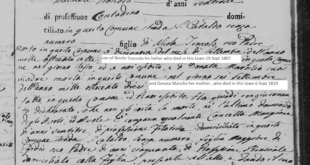Meeting someone at a gathering —
Piacere di conoscerla…
Where do two people who form a lasting relationship have their first encounter?
Many times soon-to-be couples are introduced by a friend, often at a festa (party). The Italian verb conoscere is used when two people first meet.
In a previous blog, The Holidays in Italy, we discussed the many variations of friendly Italian introductions, and the most common reply, “Piacere di conoscerla,” for, “It is a pleasure to meet you.” This phrase uses the formal “la” to mean “you.” More commonly, though, and especially at informal gatherings of young people, the familiar “ti” is used for “you” and also placed at the end of the verb conoscere. Luckily for students of Italian, the entire phrase is most often shortened to the easy-to-remember and pronounce, “Piacere.” The simple reply is, “Piacere mio,” for, “The pleasure is mine.”
“Piacere di conoscerla/ti.”
“It’s a pleasure to meet you.” (formal/familiar)
– or –
Piacere.
(It’s a) pleasure (to meet you.)
Piacere mio.
The pleasure is mine. / My pleasure!
After you’ve met —
Conoscere, Incontrare and Conoscersi, Incontrarsi
Once you’ve officially met someone, technically it can be said that you “know” them. Again, the verb conoscere comes into play when talking to a friend about this new encounter. In this case, the context is helpful to determine if conoscere means you’ve met someone or already know a person. Often the speaker’s use of adverbs or adjectives in the sentence will act as “helping words” to clarify the different meanings of conoscere.
Remember that when we use conoscere with the meaning
“to know,”
this is in regard to “being familiar with” a person or place.
There is another verb that means, “to know a fact,” which is sapere.
If you need a refresher on the different uses of the Italia verbs conoscere and sapere, visit our blog
I Know: Sapere vs. Conoscere.
For a meeting that has been planned, use a different verb that also means “to meet” — incontrare. Of course, you can always meet someone you already know by chance and in this case, incontrare per caso is a useful phrase to describe the event.
The reflexive forms of both conoscere and incontrare — conoscersi and incontrarsi — are used when in English we would say, “each other.” This use of reflexive verbs has been discussed in a previous blog, Italian Reciprocal Reflexive Verbs.
For our meeting and greeting phrases, two sentences that use the reflexive verbs conoscersi and incontrarsi are helpful to remember. For instance, one may approach another at a gathering with the line, “Ci conosciamo?” The ci in question asked stands in for “each other” so the sentence means, “Do we know each other?”
In a situation where two friends are planning to meet each other, the verb incontrarsi comes into play, for instance, to say, “Let’s meet each other at 8,” which would be: “Incontriamoci alle otto.”
To discuss a one-time meeting in the past using the Italian passato prossimo, use avere with the past participles conosciuto and incontrato.
Below is a sample conversation between a young girl Mary and her mother about a gathering Mary attended the night before. Notice the use of the verbs conoscere, incontrare, and incontrarsi, which are printed in green to stand out. The Italian “helping words” have been printed in red. As often happens between parents and children, Mary’s mother tries to clarify the situation and gain insight into what has really happened while her daughter was away for the evening.
Maria: Ieri sera sono andata alla festa di Anna. Ho conosciuto tante belle persone.
Mary: Last night I went to Ann’s Party. I met (understood for the first time) lots of nice people.
Mamma: Ma tu già conosci i cugini di Anna. C’erano anche gli amici di Anna dell’Università là che tu non conosci?
Mom: But you already know (as in know a person, clarified with already) Ann’s cousins. Were Ann’s friends from college that you haven’t met /don’t know there as well?
Maria: Si, tutti e due. Anna ha invitato entrambi i suoi cugini e i suoi amici.
Mary: Yes, both. Ann invited both her cousins and her friends.
Infatti ho incontrato Lucia, una cugina di Anna per caso la settimana scorsa e anche Lucia era alla festa stasera.
In fact, I met (Mary met someone she already knows, how they met clarified with a later phrase) Lucy, one of Ann’s cousins by chance, last week, and Lucy was also at the party last night.
Mamma: Interessante. Ma hai conosciuto anche qualcuno di nuovo, di speciale?
Mom: Interesting. But did you meet (for the first time, emphasized with the adjective “new” that follows) anyone new, special?
Maria: Forse… Ho conosciuto un certo Paolo. Lui è uno studente all’Università. Studia storia. Mi è piaciuto tanto.
Mary: Perhaps… I met (for the first time) a certain Paul. He is a student at the college. He studies history. I liked him a lot.
Maria: Ci incontriamo di nuovo per un caffè lunedì!
Mary: We (will) meet each other (now a scheduled meeting between people who know each other) again for coffee on Monday!
Simple Italian phrases to invite someone out —
Despite the fact that certain pick-up lines continue to be popular, asking another to join you in an outing can be as simple as saying, “Why don’t we get together?” Below are four sample Italian phrases that can be used to approach someone you want to get to know better. Of course, there are many variations. Chose the one that fits your style or invent your own!
Ci conosciamo?
Do we know each other?
Penso di conoscerti già.
I think that I’ve met you before.
Credo che ci siamo già visti prima? …da qualche parte?
Haven’t we seen (already met) each other before? …around here?
Perché non ci vediamo?
Let’s get together. (lit. Why don’t we get together/see each other?)
Follow your introductory question with volere or piacere in the familiar “you” to ask that special someone if they’d like to join you at a particular place. The only tricky thing in this case is the use of the Italian prepositions in and a. Remember that Italian prepositions are always assigned to the place they refer to. If you need a refresher on how to use the Italian prepositions in and a, visit a a previous blog in this series.
| Vuoi andare… | Do you (familiar) want to go… |
| al ristorante? | to a restaurant? |
| al bar? | to a (coffee) bar? |
| al caffé? | to a cafe? |
| in pizzeria? | to a pizzeria? |
| Ti piacerebbe… | Would you like to… (familiar) |
| Vuoi… | Do you want to… (familiar) |
| andare in piazza? | go to the piazza? |
| andare in chiesa? | go to church? |
| andare al cinema? | go to the movies? |
| andare al concerto? | go to the concert? |
| andare allo spettacolo? | go to the show (performance)? |
| andare alla mostra? | go to the show (exhibit)? |
| andare al museo? | go to the museum? |
| andare a ballare? | go dancing? |
| andare in chiesa? | go to church (get-together) |
If you’d rather invite someone for an intimate date, rather than to a crowded place, just conjugate potere (to can) into “Posso?” for a dinner invitation. Use the formal la to show respect or if you are not certain your offer will be accepted, or the informal ti to be friendly. Additional phrases to exchange telephone numbers and email addresses are below.
Posso invitarla a cena?
May I invite you (polite) to dinner?
Posso invitarti a cena?
May I invite you (familiar) to dinner?
Posso avere il tuo… May I have your…
…numero di telefono? …telephone number?
…indirizzo email? …email address?
Inviting someone to join a group —
Venire con noi… and Unirsi a noi…
Perhaps you’d like to invite a new (or old) friend to a group event. In this case, add the phrase “venire con noi,” for “come with us” to the questions,” Would you like to…”” or “Do you want to…?” Again, be careful when using Italian prepositions to pick the one that is associated with the place you want to mention!
| Ti piacerebbe… Vuoi… |
Would you like to… (familiar) Do you want to… (familiar) |
| venire con noi… | come with us… |
|
in spiaggia? |
to the beach? |
| al mare? | to the sea? |
| in montagna? | to the mountains? |
| in campagna? | to the countryside? |
A slightly more complicated way to ask the same questions is to replace the verb phrase “venire con” with the reflexive verb unirsi and the preposition a.
Unirsi means “to get together” or “to come together.” We must think in Italian to use this verb, as getting together is not reflexive in English, and the translation will not be exact. It may be helpful to remember that Italian reflexive verbs often stand in for the English phrase, “to get.” Some examples below show how this verb can work.
For the first example, we are speaking in the familiar to one person, or addressing the question to “you.” First conjugate the verb volere into the tu form, which is vuoi, as we have done in our previous examples. Then use unirsi in the infinitive form, but make sure to change the “si” to “ti.” Unirsi is always followed by the preposition a.
Vuoi unirti a noi in spiaggia?
Do you want to get together with us at the beach?
To ask, “Can you come with us?” Just substitute the helping verb potere for volere.
Puoi unirti a noi al mare?
Can you get together with us to the sea?
To ask the same question in the third person, that is if Mary, Mike, she, or he can join you, just conjugate potere in the third person and keep the “si” ending of the infinitive unirsi.
Può (Maria/Marco/lei/lui) unirsi a noi al mare?
Can (Mary, Mark, she, he) get together with us to the sea?
Or, conjugate unirsi in the present tense to question if someone wants to join your group. Unirsi is a regular -ire verb of the -isc type in the present tense: unisco, unisci, unisce, uniamo, unite, uniscono.
Ti unisci a noi?
Do you want to get together with us?
Si unisce a noi?
Does she/he want to get together with us?
How to say, “I love you” in Italian —
Ti amo and Ti voglio bene
Finally, that special someone you have met and gone out with becomes YOUR special someone. Declare your love to each other with one of two simple Italian phrases.
“Ti amo!” means “I love you!” in Italian. Amo is the first person conjugation of amare(to love) and is only used to express romantic love.
The older phrase, still sometimes used today to declare your love another romantically is, “Ti voglio bene.” This phrase is common in older Italian movies and can still be heard today to express one’s devotion to their partner with the meaning, “I love you.” However, it is now most often used between family members or friends as the expression, “I care for you.” or “I wish you well.”
Remember how to use the Italian verbs
conoscere, incontrare, and unirsi
and I guarantee you will use these verbs every day!
For “All the Italian you need to enjoy your trip to Italy,” click on the links below to purchase my Conversational Italian for Travelers books – Kathryn Occhipinti


 Fra Noi Embrace Your Inner Italian
Fra Noi Embrace Your Inner Italian






